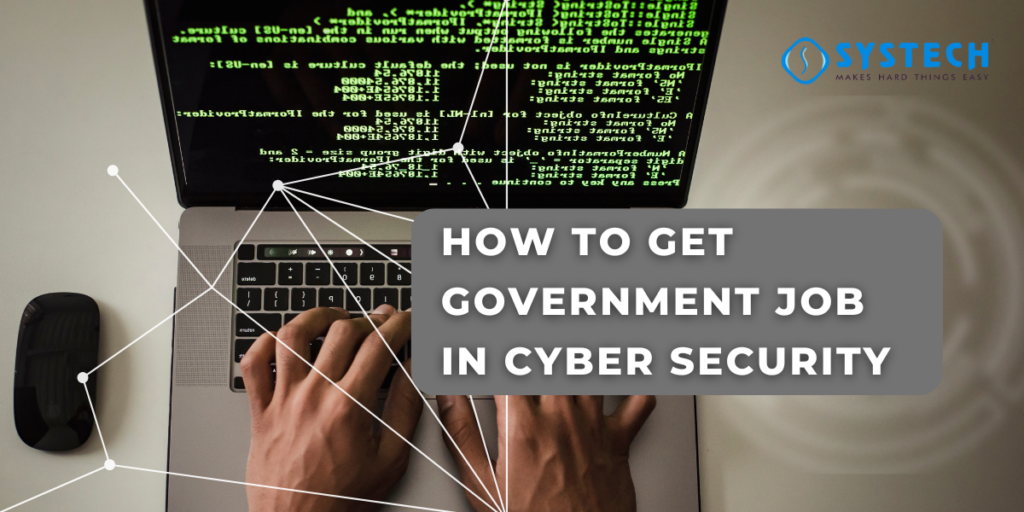Table of Contents
How to Get a Government Job in Cybersecurity
Understanding Cybersecurity Roles in Government
Common Positions Available
- Cybersecurity Analyst: These professionals monitor networks for security breaches and investigate incidents.
- Information Security Officer: Responsible for developing and implementing security policies and procedures.
- Ethical Hacker: Also known as penetration testers, they simulate attacks to identify vulnerabilities.
- Incident Response Specialist: Focuses on responding to and managing security incidents.
- Cybercrime Investigator: Works with law enforcement to investigate cybercrimes.
Skills Required for Cybersecurity Jobs
To excel in these roles, candidates need a mix of technical and soft skills.
- Technical Skills:
- Proficiency in programming languages (e.g., Python, Java).
- Knowledge of network security protocols.
- Familiarity with cybersecurity tools (e.g., firewalls, intrusion detection systems).
- Soft Skills:
- Strong analytical thinking.
- Excellent communication abilities.
- Problem-solving mindset.
Educational Requirements
Degrees Needed
Most government positions require at least a bachelor’s degree in fields such as Computer Science, Information Technology, or Cybersecurity. Some roles may even necessitate advanced degrees for higher-level positions.
Certifications That Enhance Employability
Certifications can significantly boost your employability in the cybersecurity field. Here are some highly regarded options:
Certification | Description |
CISSP (Certified Information Systems Security Professional) | Recognized globally for information security expertise. |
CompTIA Security+ | Entry-level certification covering foundational security concepts. |
CEH (Certified Ethical Hacker) | Validates skills in ethical hacking techniques. |
CISM (Certified Information Security Manager) | Focuses on managing and governing information security programs. |
Alternative Education Paths
Gaining Experience
Internships and Entry-Level Positions
Internships provide invaluable experience and often lead to full-time positions. Look for opportunities within government agencies or private companies that work closely with the government.
Networking Opportunities
Building connections is crucial in this field. Attend industry conferences, workshops, or local meetups to meet professionals who can provide guidance or job leads.
Volunteer Work or Projects
Engaging in volunteer work or personal projects can help you build your portfolio. Consider contributing to open-source cybersecurity projects or participating in Capture The Flag (CTF) competitions.
Navigating the Application Process
Finding Job Openings
Government job openings can be found on various platforms, including:
- USAJOBS.gov
- State government websites
- LinkedIn job boards
Understanding Security Clearance Requirements
Many government positions require security clearance due to the sensitive nature of the work. The process involves background checks and may take several months, so it’s essential to be prepared.
Crafting a Strong Resume and Cover Letter
Your resume should highlight relevant experience and skills tailored to the specific job you’re applying for. Use action verbs and quantify achievements whenever possible.
Preparing for Interviews
Common Interview Questions for Cybersecurity Roles
Be ready to answer both technical and behavioral questions during interviews. Here are some examples:
- Technical Questions:
- What steps would you take to secure a network?
- Can you explain how a firewall works?
- Behavioral Questions:
- Describe a time you faced a significant challenge in your work.
- How do you stay updated on current cybersecurity threats?
Demonstrating Knowledge of Current Cyber Threats
Staying informed about recent cyber threats shows your commitment to the field. Regularly read cybersecurity blogs, follow industry leaders on social media, and participate in forums.
Career Advancement in Government Cybersecurity
Opportunities for Growth
Government roles often provide clear pathways for advancement. You can move from entry-level positions into management roles such as Security Architect or Cyber Intelligence Analyst with experience and continued education.
Continuing Education and Certifications
Conclusion
In summary, securing a government job in cybersecurity requires dedication, education, and practical experience. By understanding the various roles available, obtaining necessary qualifications, gaining relevant experience, navigating the application process effectively, preparing thoroughly for interviews, and continuously advancing your skills, you can position yourself as a strong candidate in this crucial sector.
Related Courses
FAQs
What Are the Most Important Skills for a Cybersecurity Job in the Government Sector?
To thrive in government cybersecurity roles, professionals must possess a mix of technical and soft skills. Here are some of the most important competencies:
- Technical Skills:
- Network Security: Understanding firewalls, intrusion detection systems (IDS), and secure network configurations is essential for protecting sensitive data.
- Risk Management: The ability to identify, assess, and mitigate risks is critical. Cybersecurity professionals must implement strategies to manage vulnerabilities effectively.
- Incident Response: Skills in managing security incidents, including detection, analysis, and recovery from breaches, are vital to minimize damage.
- Programming Proficiency: Familiarity with languages like Python and Java helps in automating tasks and analyzing vulnerabilities.
- Cloud Security Knowledge: As more government services migrate to cloud platforms, expertise in securing cloud environments is increasingly important.
- Soft Skills:
- Problem-Solving: The ability to think critically and develop solutions under pressure is essential for tackling complex cyber threats.
- Communication: Cybersecurity professionals often need to explain technical concepts to non-technical stakeholders. Clear communication is key.
- Attention to Detail: A meticulous approach helps in identifying vulnerabilities that could be overlooked.
How Can I Tailor My Resume to Stand Out for a Government Cybersecurity Position?
Crafting a standout resume for a government cybersecurity position requires strategic emphasis on relevant skills and experiences. Here are some tips:
- Highlight Relevant Experience:
- Focus on past roles that demonstrate your cybersecurity skills. Use specific examples that showcase your achievements (e.g., “Implemented a new firewall system that reduced unauthorized access by 30%”).
- Use Keywords from Job Descriptions:
- Tailor your resume by incorporating keywords from the job listing. Terms like “incident response,” “risk management,” and “network security” should be included where applicable.
- Showcase Certifications:
- List any relevant certifications such as CISSP, CompTIA Security+, or CEH prominently. These credentials validate your expertise and commitment to professional development.
- Quantify Achievements:
- Whenever possible, use numbers to illustrate your impact (e.g., “Led a team that successfully mitigated 15 security threats within six months”).
- Format for Clarity:
- Use bullet points for easy readability and ensure that your layout is clean and professional.
What Are the Common Challenges Faced by New Cybersecurity Professionals in Government Roles?
Entering the field of cybersecurity within government agencies comes with its own set of challenges:
- Navigating Bureaucracy: Government processes can be slow-moving. New professionals may find it frustrating to implement changes or seek approvals due to bureaucratic hurdles.
- Limited Resources: Some government agencies may face budget constraints that limit access to advanced tools or training programs necessary for effective cybersecurity.
- High Stakes Environment: The pressure of protecting sensitive information can be daunting. New professionals might feel overwhelmed by the responsibility of safeguarding national security.
- Keeping Up with Evolving Threats: Cyber threats are constantly changing. Staying updated on the latest trends and technologies requires continuous learning and adaptation.
How Does the Job Market for Cybersecurity in Government Compare to the Private Sector?
The job market for cybersecurity professionals varies significantly between government and private sectors:
- Job Security: Government positions often provide more stability compared to private sector roles, which can be subject to market fluctuations.
- Salary Differences: Generally, private sector jobs may offer higher salaries due to competition for talent. However, government roles often come with excellent benefits, including retirement plans and health insurance.
- Work-Life Balance: Government jobs typically emphasize work-life balance more than many private companies, which may demand longer hours or on-call availability.
- Opportunities for Advancement: Both sectors offer pathways for advancement; however, government positions may have clearer hierarchies and promotion tracks based on tenure and performance evaluations.
What Are the Key Responsibilities of a Cybersecurity Analyst in a Government Agency?
Cybersecurity analysts play a crucial role in safeguarding government networks. Their key responsibilities include:
- Monitoring Networks for Security Breaches: Analysts continuously oversee systems for any signs of unauthorized access or anomalies.
- Implementing Security Measures: They deploy firewalls, encryption protocols, and other security technologies to protect sensitive data.
- Conducting Risk Assessments: Regular evaluations help identify vulnerabilities within systems that need addressing.
- Responding to Incidents: When breaches occur, analysts must act quickly to contain threats and mitigate damage through established incident response protocols.
- Reporting Findings and Recommendations: Analysts prepare detailed reports on security incidents and suggest improvements to existing security measures based on their findings.

